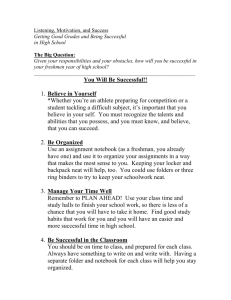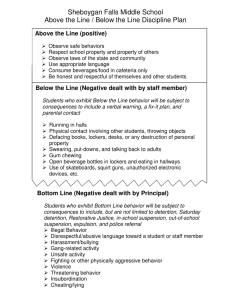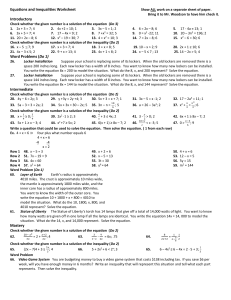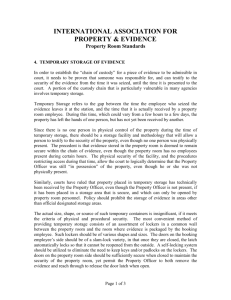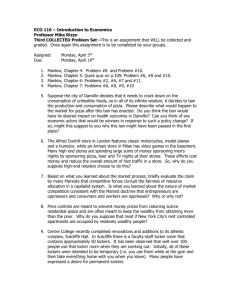Time management: A study schedule
advertisement
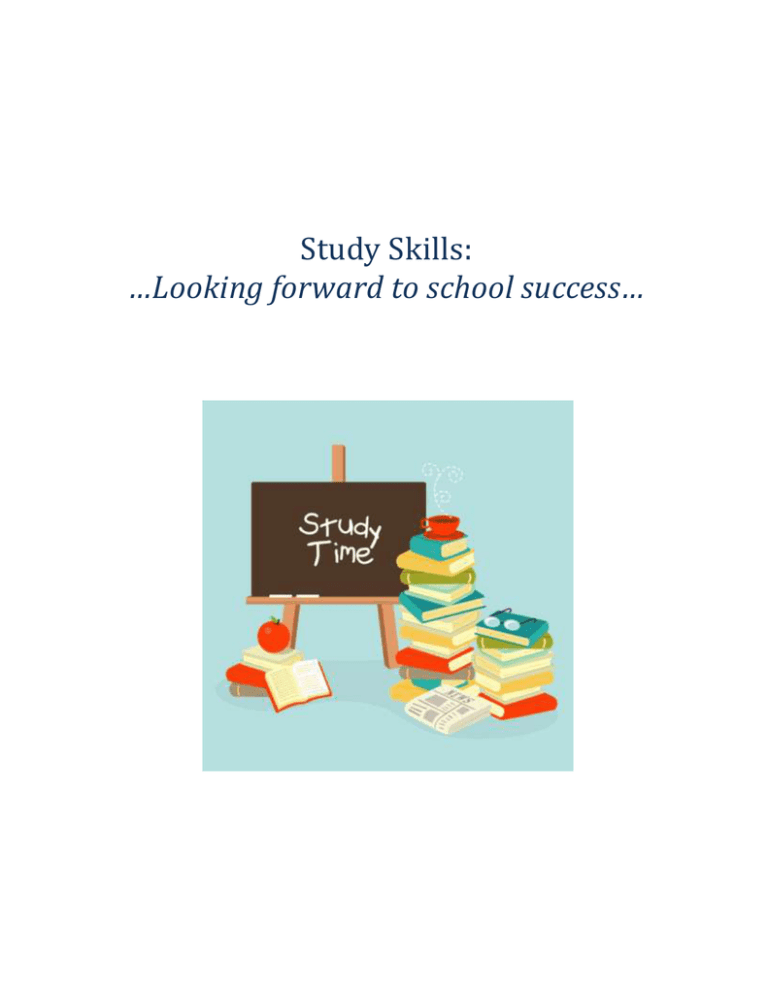
Study Skills: …Looking forward to school success… Week 1: defining success & skills for success How do you define success Individual examples of personal success Ask each student what skills they used or have to achieve that success Start a group discussion; list examples on the board of individual success; start a separate list of the skills students identified to achieve that success (e.g. sports success, piano recital, etc.) Goal: (1) point out that there are different kinds of successes and (2) they already possess the skills to attain school success How do you define school success Ask students what their ideas of school success are How can you use the skills listed to achieve school success Use the information that you have written down to start this discussion How to be successful at Harker Review of available supports at Harker o HHMS – what is it, how do we use it? o Extra Help o 10th period o Review the guidelines/possible disciplinary consequences for not attending a required EH or 10th period o Using teachers, counselors, advisors, peers for support Asking for help o How do you ask for help? E.g. email teacher, after class/school, EH, etc o When do you ask for help? Don’t wait until it’s too late!! o What to do when your questions aren’t answered? E.g. Other supports on campus Goal: to increase the student’s awareness of the many supports on campus and to encourage students to be self advocates Planning: Student Planner, Class Schedule, Lockers, Back Pack Work with students to go through the student planner Review class schedules and map out where their classes and lockers are Students can write down their schedules on the last page in their student planners Discuss how to plan the day (convenient bathroom breaks, water fountain breaks, etc.) Visit lockers, discuss creative and efficient ways to use their lockers & backpacks Goal: to get students thinking ahead and planning their day, establishing a routine that will help keep them organized. This can be an open discussion and ideas generated can be written down on the board. Suggested activity: each student can color code their own campus map according to their class schedule, locker location, etc. Week 2: organization & time management Organization: Binders, Lockers Make sure your students know the binder rules/guidelines for each class Things to keep in mind about binders/backpacks: o Need a place to keep current class notes and handouts o A way to get everything from home to school and from classroom to classroom o A place to store papers/handouts when not using it o Use the weekends to do weekly clean-up and re-organization Share ideas about how to keep binders organized and clean Share fun ideas about how to use lockers o Things that can be useful in your locker: campus map, a copy of your schedule, sticky notes, white boards Being organized with your stuff helps you to be more efficient and spend more time on important things –vs. - shuffling papers and looking for stuff! Make sure students know about the lost & found areas on campus Goal: Increase awareness of the need for organizing their ‘stuff’ regularly and the advantages of being organized. Can be a group discussion and ask students to share examples of their binders, lockers, etc. Time Management: Bell system Make sure students know the bell schedule, review special days like Mondays and Fridays What to do if you are running late for a class? o Checking in at the front office in the morning o Having a pass if late for classes o Common reasons for being late to class o How can you avoid being late Encourage students to plan when to go to their locker, when to go to the bathroom, when can they snack etc. o Use the 5 minute passing time between classes efficiently How many of your students have a watch?? Goal: to increase their awareness of time management throughout the school day Week 3: managing HW & how to study Brief Review of time management, binder & locker organization Ask students what is working for them and what is not working for them Organization: Setting up a study center at home Discuss the importance of setting up a study center o Helps with concentration o Gets you into the habit of studying with an established routine (which means less time needed to get organized and ‘ready’ to do HW or study) Discuss ‘great study areas’ – vs. – ‘bad study areas’ o Great study areas: calm and quiet area of the house, at a desk or table where you can keep your supplies, area with good lighting, no distractions o Bad study areas: on a bed or couch in front of the TV, on the bus or in the car Be prepared at home as well; make sure you have the supplies you will need to complete assignments and other homework. Before going to bed, make sure to organize the backpack and make sure you have what you need for the next school day Waiting until the morning to organize your backpack may be a bad idea Discuss reasons why and what students can do to avoid it Time management: A study schedule Making a study schedule: Helps you set goals & get your work done Break down tasks into manageable parts Make it a routine Make the most of your time Set realistic goals for studying and HW Do students know their teachers’ expectations for HW time for each subject? Don’t force your parents to be homework police! Get ready for school the night before to avoid morning panic Be on time for school! Handout example of a study schedule. Time management: homework time, study time, AND relaxation time Try to study at the same time each day so that people know to leave you alone Try to have the same routine every night Find times that are convenient for you and everyone else around you Make sure to schedule some ‘down time’ before bed, at least 30 min. o Your brain needs time to wind down and get ready for sleep o Without sufficient sleep your brain is running on reserve power! Goal: Encourage students to plan and organize at home as well, and reinforce the importance of managing their study time and SLEEP! Group discussion can include: How many hours do you sleep? How many hours are you spending on HW? Are there times during the day that you can do some HW? What do you do at home to ‘wind down’ and get ready for sleep? do better on tests brain works better better concentration more energy better physical health Week 4: how to listen Review / check-in Ask students what is working for them and what is not working for them If any students are having some difficulties, try to brainstorm as a group to help that student Briefly review any of the past topics as needed by the students Developing good listening skills Why are good listening skills important? The ability to listen carefully will allow you to: o better understand assignments and what is expected of you o show support for your teacher and peers around you o work better on team assignments o answer questions better How to be a good listener: o Look at the speaker, don’t be afraid to make eye contact o In a classroom, pretend the teacher is talking to just you o Try not to talk or be disruptive while someone else is talking If you are easily distracted or can’t concentrate while someone is speaking: o Let that person/teacher know o Try to sit in the front of the classroom near the teacher Ideas for group discussion: Are there differences between how you (1) listen to your friends (2) listen to your parents (3) listen in class o What distracts you from being a good listener o What do you do to help you listen better o How do you feel when someone is not listening to you? Goal: remind students about respectful listening during class as well as outside of class Week 5: note taking Improve your note taking skills Taking good notes reinforces what you learn as well as helps you remember what you hear! Good notes also serve as a study guide that helps you get your best grade on tests: Here are suggestions for taking great notes: When you are listening in class or reading at home, write down the main points. These include… o Main idea o Important names, dates, numbers o Key details o Any questions that you have about the material To find key information listen for or read for word clues such as… o The most important reason o The main point us o This will be on the test o Listen/read for anything that is repeated in different ways o Pay special attention to the beginning and the end of a lecture Outline & highlight o when taking notes from a notebook, arrange your notes in an outline o follow the book’s organization o review your notes and highlight the important information Organize your notes with your handouts If the teacher writes something on the board, assume it’s important and write it down too Are students aware of how to supplement their own notes? o Teacher’s notes posted on line? o Teacher’s outlines? o Note sharing? o How to integrate multiple sources of information and organize them together by topic Write clearly!!! Your notes are useless unless you can read them. Goal: Give students basic information for good note taking, increase their awareness of the necessity for listening and taking good notes. Suggested activity: ask students to take out a sample of any notes they have with them and hand it to the student next to them. List on the board students’ comments about the notes. Week 6: tests, tests, tests Test Preparation Tips Preparation for your first test should begin the first day of class! o includes studying, completing homework assignments, listening well, taking good notes, being organized, planning your study routines, establishing good study habits Budget your time so you have sufficient time to study; check HHMS and test dates Take careful notes and ask questions about anything that you are confused about. Ask the teacher to specify the areas that will be emphasized on the test. Make sure you attend the class right before the test and attend the extra-helps right before the day of the test; it's another prime time for the teacher to give out more hints Make sure you attend all review sessions Go over any material/problems from practice tests, HW's, sample problems, study guides, etc. and do practice problems at least 2- 3 times, even the problems you keep getting right! Write the main ideas/information/formulas onto a sheet that can be quickly reviewed many times, this makes it easier to retain the key concepts that will be on the test. Eat before a test, having food in your stomach will give you energy and help you focus, but avoid heavy foods which can make you groggy especially if your test is right after your lunch! Be early to the classroom before the test so you have time to settle in, get ready and relax before you start! Go to the bathroom, get a drink of water if you need to before walking into the classroom, you don't want to waste any time worrying about your bodily needs during the test! Wear a watch if it helps you! Be aware of how much time you have left and pace yourself. Get as much sleep the night before as you can! Taking the Test: Read directions TWICE and follow directions exactly, ask if you don't understand them When reading the test question, read/listen for context clues and other ‘signal words’ that can help you find the answer First, answer the questions you are sure of and can answer quickly If you get stuck on a question, make a mark next to it, move on. Break long complicated questions into bite-size pieces and focus on one part at a time. Use all of the time you are allowed. If you finish early, check and recheck. On matching items...mark answers as you use them, do the easy ones first, look for obvious matches in parts of speech and types of items. On fill-in-the-blanks…look for clues e.g. is an “a” or “an” before the blank, e.g. is the verb singular or plural On multiple choice questions…answer all questions, even if you are just guessing! Never leave a multiple choice question blank!! How NOT to be nervous about a test: Here are some things you can do before, during, and after a test Use good study techniques and habits so you can be confident Have a positive attitude as you study. Think about doing well, not failing. Think of the test as an opportunity to show how much you have learned. Go into the test well rested and well fed. Get enough sleep the night before the test. Eat a light and nutritious meal before the test. Stay away from junk foods. Stay relaxed during the test. Taking slow, deep breaths can help, focusing Don't worry about other students finishing the test before you do. Take the time that you need to do your best. Once you finish the test and hand it in, forget about it! There is nothing more you can do until the graded test is returned to you. When the graded test is returned to you, analyze it to see how you could have done better. Learn from your mistakes and from what you did well. Apply this knowledge when you take the next test. In preparation for the next test make sure you talk to the teacher about any missed questions and concepts you still don’t understand You have to know the material to do well on a test. You have to control nervousness to show what you know!! p 6 of the student planner is a grades log and p7 is on test taking skills Goal: to improve study habits and take tests confidently; get students to think about the process of taking tests – vs. – just memorizing study material A group discussion can include recent experiences on tests, any questions about upcoming tests, etc. Week 7 Studying text books and utilizing the SQ4R method: Discuss how students currently reading method Go over the “Ten Tips” and SQ4R method Practice the tips and techniques with current work or texts. (these will be handouts for the students to take) SURVEY -QUESTION -READ -RECITE –REVIEW: SQ4R STEP I SURVEY Look over the material you have been assigned to read. Be sure and do all of the steps listed below as you review your assigned reading material. 1. Read the title of the article, report or chapter 2. Read the introductory paragraph or paragraphs. 3. Read any quotes the author has used to introduce the chapter 4. Notice the heading, which are usually in bold-face type. 5. Notice key or important words that may be italicized or printed in the margins. 6. Notice pictures, graphs, charts or maps. Read their captions carefully. 7. Read the author's summary, if he presents one. STEP II QUESTION After surveying your assigned reading material, you need to identify what the author will be explaining to understand the purpose when you are reading. Below are the steps to help you decide what the author's main ideas are. 1. Look at each heading in the reading selection 2. Ask yourself what the heading means 3. Ask yourself what questions the author will answer in this section. 4. Write the questions down so you may refer to them as you read. STEP III READ You may need to read each section carefully. Remember to keep the questions you asked yourself in mind as you read. Save time and read with a purpose. STEP IV RECITE Recite means to answer questions. In this step you need to answer the questions you asked in STEP V – “RITE”. You might use one of the techniques listed below to help you remember the information you read. 1. Briefly write down the information which answers the questions you asked. 2. Discuss the information you found with assigned partner or group member. 3. Write down definitions of words you think are important. 4. Write words or ideas down which you may want the teacher to discuss with you STEP VI REVIEW There are two times to review all your notes. The first review comes immediately after you've finished your assignment. The second review comes before your test. Ten Tips for Reading Textbooks 1. Read the chapter before the lecture. This will help you build background on the topic, learn the basic organizational structure of the material, and take better lecture notes. 2. Divide the chapter into readable chunks. A long chapter is probably best read smaller chunks. Dividing the chapter into smaller reading segments increases your comprehension and decreases the time you spend reading the chapter. 3. Be specific about when and where you will do your reading assignment. Put it on your “To Do” list and choose times when you are most alert, usually during daylight or early evening hours. Select a location that is quiet, free of distractions, and well lighted (such as the library). A routine of time and place aids in concentration. 4. Space your reading. Spread the chunks out over one or two days. Take breaks between sections or read one chunk in the morning, another in the evening, and the third chunk the next day. 5. Preview the chapter before you read. Read the title, introduction, and headings, glance at charts and pictures, and read the summary. A two-to-five-minute preview reduces the total time you spend reading and increases your comprehension. 6. Turn chapter headings into questions before reading. This will give you a specific purpose for your reading, resulting in better comprehension. For example, the heading “Causes of the Civil War” can be turned into the question, “What are the causes of the Civil War?” By reading to answer the question, your focus will be greatly improved. 7. Mark the text or take notes as you read. Highlight, underline, or take notes at the end of each section. Wait until you finish reading the paragraph or small section before you begin to mark your text. 8. Monitor your comprehension. Stop to check your understanding of the material at regular intervals. If the material is easy to understand, you may be able to wait until the end of each main division of the chapter to summarize what you have learned. If the text is difficult, you may need to pause at the end of each paragraph. 9. Review immediately what you read. After you complete your reading assignment, take five to ten minutes (or more) to review what you just read before forgetting takes place. Develop a recall column or summarize the key information. 10. Prompt your memory. Use the headings of your textbook or your notes to prompt your memory. Recite the information out loud or write it down. This will help transfer the information into long-term memory. Week 8: now that you have your laptop Helping Students Manage Their Computer Workload Planning: Frequently check HHMS, printing whenever needed Frequently check Athena Deadlines for class assignments and sending yourself reminders o Using Google calendar, sending yourself email reminders, using Sticky Notes Backing up your work: Always save your work to the server on a regular basis Power management: charge at home every night Finding a place to study : review setting up a study space at home o laptop should not be on your lap, but on a desk or table o Good lighting Understanding teacher expectations for computer time and workload o What is the actual workload? o Understand how much time your teacher is expecting you to be on the computer during class and at home o Avoid temptation to chat, email, web surf during HW time Plan time for work that can be done offline and work that needs to be done online o Avoid keeping your laptop on and open during offline work Organization: Setting up useful shortcuts on desktop Managing files and folders o Labeling filenames and folder names: keep names simple and easy to remember o Useful to create subfolders for each subject folder
